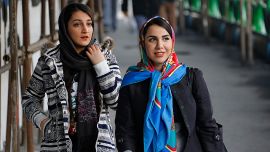Activists favouring the legalisation of abortion in Argentina have revived their struggle, pressing President Alberto Fernández to keep his promise and deliver a bill. Meanwhile, churches are backing up their opposition with the argument that the pandemic has placed the health system in a state of emergency.
Using the slogan "Es urgente. Aborto legal 2020," the Campaña Nacional por el Derecho al Aborto Legal Seguro y Gratuito (“National Campaign for the Right to Legal, Safe and Free Abortion”) is calling on its supporters to "saturate the social networks, go out on the streets showing our headscarves everywhere and paint Argentina green in the next few weeks with artistic impact."
The green headscarf, symbol of the struggle favouring the voluntary interruption of pregnancy, is seeking the form of expressing itself "with every precaution" to avoid Covid-19 contagion after the mass marches of 2018.
All eyes are now on Fernández, the centre-left Peronist president who inaugurated parliamentary sessions on March 1 saying he would present a bill to legalise abortion and thus stand by his electoral commitment.
The initiative was cut short by the pandemic quarantine decreed on March 20 when the parliamentary sessions were suspended, later to be renewed in remote form, which aggravated the tensions between the government and the opposition.
"We’re finishing off the work" on the bill, Fernández said on Tuesday.
"I wouldn’t want this issue to become a new dispute among Argentines. We respect everybody," he underlined.
Fernández, an ally of Pope Francis, plans to present simultaneously a "Plan of 1,000 days" providing state assistance to pregnant women and their children in a vulnerable situation, a form of evening the balance and avoiding decisions to abort for economic reasons.
"We value very positively the political intentions but until now the postponement has been continuous. We’re still waiting," psychoanalyst Martha Rosenberg, a pioneer of the Campaña Nacional movement, told AFP.
The group is pushing its own bill allowing the voluntary interruption of up to 14 weeks of pregnancy, but they recognise that a government bill could pull votes in the ruling coalition’s caucus where some legislators are still reticent.
The current law, dating back to 1921, authorises the interruption of pregnancy when the product of a rape or when the woman’s health is in danger.
Democracy’s debt
"We cannot wait. It’s this year, it’s now, it’s urgent. Women keep dying due to the complications from clandestine abortions," Marta Alanis from the Catholic Women for the Right to Decide organisation told AFP.
According to the Health Ministry around 39,000 women are hospitalised every year due to complications from clandestine abortions, avoidable if carried out in safe conditions.
"Legal abortion with medication and ambulatory treatment is much cheaper than the complications which represent a costly burden. The economic argument (against legal abortion) is fallacious," affirmed Rosenberg.
In its 15 years of history, the Campaign presented eight bills to legalise abortion but they only reached the Congress floor in 2018 amid effervescent feminist mobilisation. The women achieved a historic approval in the lower house Chamber of Deputies but the norm was rejected by a more conservative Senate.
The bill was again presented last year with the signatures of over 70 deputies and must go to ordinary sessions before November 20 or extraordinary sessions must be called, otherwise it will lose parliamentary status. 2021 is an electoral year, which would make it not propitious for debate in a country with strong Catholic influence.
"Legalising abortion is a debt owed by democracy to the inequality affecting women," maintains Rosenberg.
Churches and pandemic
The Catholic and Protestant churches have sounded the alert and now justify their rejection with the Covid-19 pandemic, which has registered seven-digit contagion in Argentina with some 30,000 dead.
"The general public health situation posed by this painful cycle makes any attempt to present and debate a law of these characteristics unsustainable and untimely," maintained the Synod.
The Christian Alliance of Protestant Churches warned that a parliamentary debate would "provoke demonstrations" on both sides.
"This is not the time to discuss abortion in the midst of a pandemic," it added.
"The Church is opposed but there is never a right time for those against. We believe that this is a public health issue and that the state should take charge," reacted Frente de Todos deputy Carolina Gaillard, who chairs the lower house’s Penal Legislation Committee.
by Liliana Samuel, AFP
























Comments